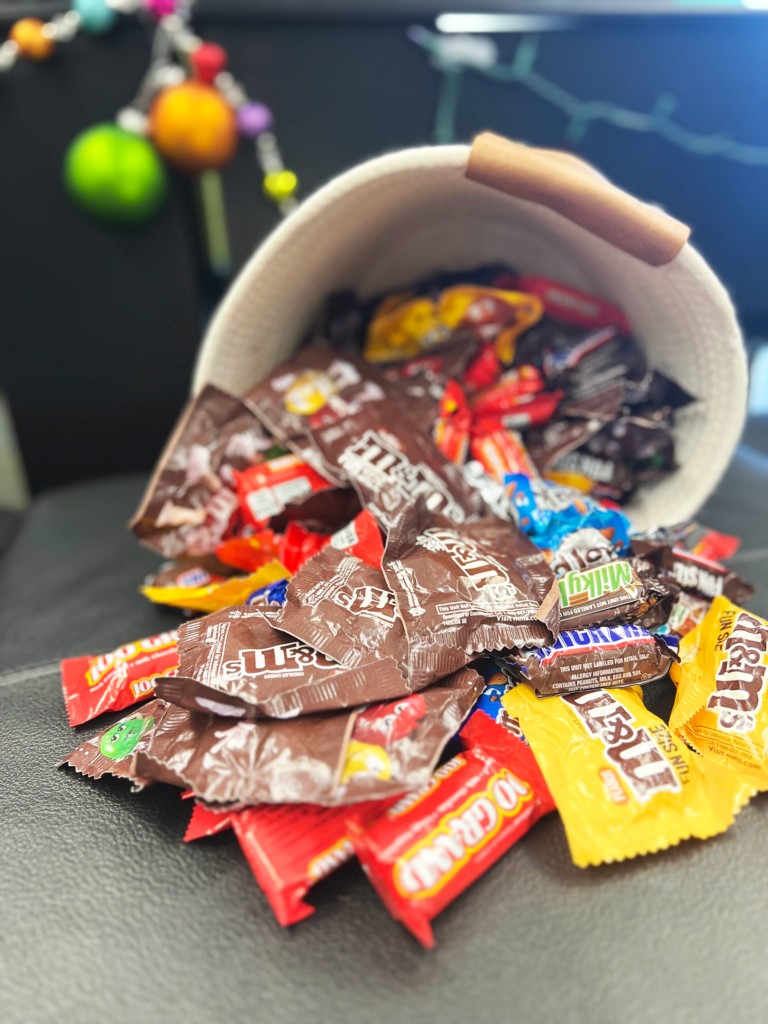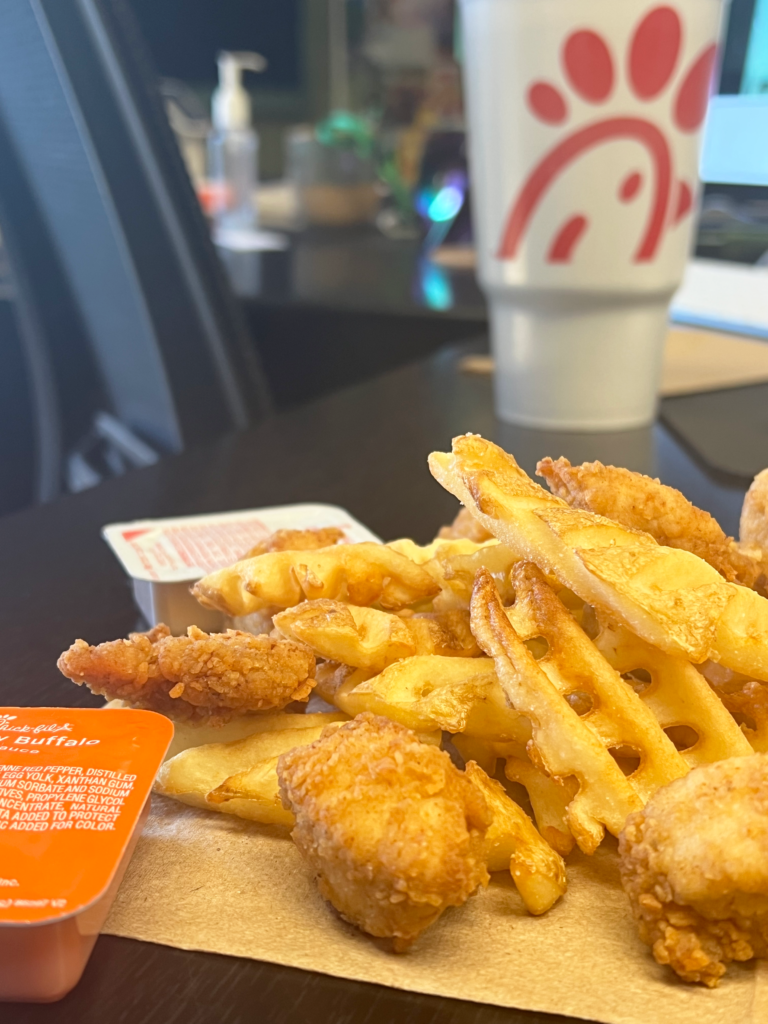Story by Raylee Foster
Photos by Mallory Harris

While sweets aren’t completely off the menu, prepare for a temporary rush rather than a long-term solution
People have cravings all the time. However, the motivations behind the foods we decide to eat can sometimes be hard to identify. We eat when we’re hungry, tired, bored and stressed. When our desire for food is driven by stress, can snacking really help you calm down?
Bedford, N.H., freshman Taryn Naftali has been exposed to new levels of stress during her first year of college. When she becomes more stressed, she begins to crave certain foods, specifically sweets, she said. Without a car, she discovered a simple solution to avoiding her cravings: removing temptation.
“Usually I stop buying snacks like M&M’s and candy for the room and just stocked up on fruits,” Naftali said. “So if I do ever get cravings for snacks, I can just eat fruit.”
When people experience stress, the brain tries to combat it, but the response isn’t always the same. According to the American Psychological Association, stress type can determine bodily response. Short-term stress — that lasts a few hours — results in an adrenaline release, which suppresses appetite, whereas long-term stress does the opposite.
When you’re stressed for extended periods of time your body releases cortisol, a hormone that encourages the body to “get things done,” according to the Cleveland Clinic. This causes inflammation in the body and results in cravings of specific food groups.
In 2002, Louisiana State University conducted a study over specific food cravings that ended up supporting the Food-Craving Inventory (FCI). What was initially meant to be a self-report measuring tool was found to be a reliable and valid measure of specific food cravings that can be used in research relating to various eating methods. The results from their study found four subscales now recognized as high fats, sweets, carbohydrates/starches and fast-food fats. This FCI was then used by the University of Pennsylvania testing the idea of stress-related cravings, breaking down the relationship between hormones and stress and food.
Foods that decrease cortisol also decrease inflammation. In 2021 dietitian from the Cleveland Clinic proposed a list of foods that can lower cortisol levels. These foods are high in Vitamin B, omega-3 fatty acids, magnesium and protein. By reducing the amount of this stress hormone, the body is less stressed overall. Foods high in vitamin C, like red peppers and citrus fruits, can improve the adrenal gland health, which releases cortisol. By ensuring it’s functioning properly, the regulation of cortisol will be more consistent regardless of stress.
Through a survey of 10 Baylor freshmen asking about the things they eat and whether they’re influenced by the stress they feel, nine out of 10 individuals felt more stressed being in college compared to high school. Everyone believed that when they were stressed their cravings increased. Some mentioned salty fries, popcorn or “simple carbs” as their go-to stress foods, whereas others were more inclined to eat sweets.
The students also noted that the foods they ate were not helping their stress. Georgetown freshman Merritt Olsovsky said giving in to cravings is “fulfilling in the moment, but not long term.” This temporary satisfaction doesn’t truly contribute to a decrease in stress, Olsovsky said.
On the other hand, San Diego freshman Kaia Wong said certain foods she craved did help with her stress levels. For Wong, stress foods are similar to comfort foods, she said. These foods fall into two categories: they either lower cortisol or increase dopamine and serotonin — the body’s happy hormones. According to UT Health, there are some comfort foods that help with decreasing feelings of stress through an emotional capacity. In Wong’s case, comfort foods increase serotonin.
Comfort foods increase serotonin because of how they make you feel and what they make you think of — they have positive associations. There are other foods that lower stress through a biological process rather than emotional. These foods can also increase the happy hormones in the body. High protein foods, especially dairy and turkey, help the body produce happy hormones, as stated in Medical News Today through a medically reviewed article by Natalie Olsen.
Other foods like probiotics target the gut’s health. A study in a 2017 biochemical journal in the National Library of Medicine shows the gut is filled with “good bacteria’’ that works to keep illness out of our bodies as well as make happy hormones. Probiotics like fermented yogurts or kombucha keep these bacteria healthy so that they can continue making happy hormones. The more happy hormones the body has, the less stress you may feel.
In most cases what we crave doesn’t fulfill what we need. In an AARP interview, professor of nutritional sciences at Penn State University, Penny M. Kris-Etherton, highlights this unparalleled relationship finding that the foods we eat when we’re stressed don’t actually satisfy what our bodies need.
“When you’re under stress, you may crave a glazed doughnut dipped in sprinkles — but tempting as it is, it won’t help your spirits,” Kris-Etherton said.
By studying nutrition, Rancho Palo Verde, Calif., junior Niki Mabry has gained an understanding of what foods are needed in order to thrive. When people crave food, they often eat that food. However, this doesn’t mean the cravings go away.
Mabry says her cravings never fully go away, but she would “recommend foods like healthy carbohydrates and sugars in fruits,” which will allow people to work with their cravings while fueling their body.

The proximity from the “grease pit” to Baylor is hard to dismiss, but even greasy burgers and fries can get old. It’s important to remember that the quick bursts of energy from fast food are just that, and don’t provide much else satisfaction.
When it comes to cravings, “there’s nothing you can do that suppresses it, but there’s things you can do to fuel your body to help with it,” Mabry said. Since certain foods can impact our hormonal releases, attempting to satiate cravings while eating these foods can contribute to a decrease in stress in the body long term, but it may not have an immediate impact on your stress level.
Mabry also drew attention to the close proximity of the “grease pit, ” a stretch of fast-food chains between Fourth and 10th Street, and near Baylor’s campus. When presented with the option to make healthy foods or stop for fast food, Mabry says, “It’s a lot less convenient to go to the store and make the healthy foods that would benefit you and help you get the energy you need since it’s so easy to get the quick bursts of energy that are not healthy for you.”
With stress levels, the freshmen said, being higher in college than high school, cravings will be higher as well. Because unhealthy options are so readily available for Baylor students, there is a greater inclination to succumb to these cravings.Miramich, Canada, freshman Tyra Humphreys is another example, noting that the accessibility of the grease pit plays into the foods she eats. The foods she craves when stressed could easily be reached because of how close the grease pit is.
While it may seem common knowledge, in a medically reviewed article in 2022 by Everlywell, they shared how many people are unaware of what foods can affect their hormones and therefore their stress levels. Even though there are foods that can help with these emotions, and accessibility plays an integral role in this process, it’s helpful to know how one can better help one’s body. By paying more attention to what foods will correct our hormone levels over what sounds good or what is accessible, one is able to help the stress levels in the body.

